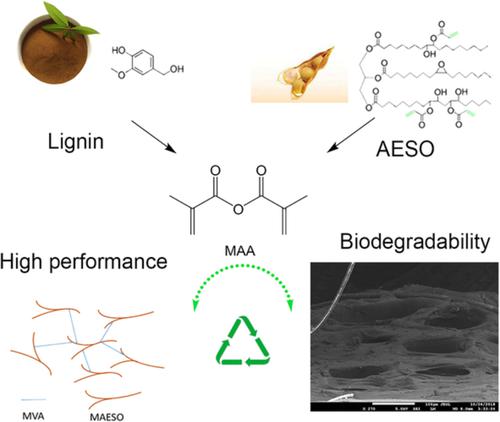当前位置:
X-MOL 学术
›
J. Appl. Polym. Sci.
›
论文详情
Our official English website, www.x-mol.net, welcomes your feedback! (Note: you will need to create a separate account there.)
Thermosets resins prepared from soybean oil and lignin derivatives with high biocontent, superior thermal properties, and biodegradability
Journal of Applied Polymer Science ( IF 3 ) Pub Date : 2019-12-23 , DOI: 10.1002/app.48827 Junying Chen 1 , Hua Liu 2, 3 , Wen Zhang 1 , Lina Lv 1 , Zuozhen Liu 1, 2, 3
Journal of Applied Polymer Science ( IF 3 ) Pub Date : 2019-12-23 , DOI: 10.1002/app.48827 Junying Chen 1 , Hua Liu 2, 3 , Wen Zhang 1 , Lina Lv 1 , Zuozhen Liu 1, 2, 3
Affiliation

|
A bio‐based monomer, methacrylated vanillyl alcohol (MVA), had been synthesized from vanillyl alcohol with methacrylate anhydride (MAA) via a solvent‐free, efficient method. The synthesis of MVA was confirmed by Fourier transform infrared (FTIR) and proton nuclear magnetic resonance (1H NMR). It was used to copolymerize with acrylated epoxidized soybean oil (AESO) to prepare a bio‐based resin (MVA–AESO). Excess MAA of MVA synthesis was further used to modify AESO with hydroxyl groups, generating (MVA–MAESO) with higher unsaturation degree. Their chemical structure and modification were characterized using 13C NMR and Fourier transform infrared analyses. Pure AESO and MVA resins were used to compare with MVA–AESO and MVA–MAESO in terms of their viscosity, curing performance, mechanical, and thermal properties. The synthesized MVA–AESO and MVA–MAESO resins showed much lower viscosities than pure AESO due to the dilution of MVA. In addition, the incorporation of MVA reduced curing temperatures, activation energies which caused MVA–AESO and MVA–MAESO had higher curing degree than pure AESO. With the combination of MVA and modification of MAA, flexible AESO networks exhibited superior flexural properties, storage modulus, glass‐transition temperature, and thermal stability. Furthermore, the biodegradation of the formulated bio‐based resins were also investigated. Results showed that the addition of monomer and the increase in the content of CC bonds did not significantly affect the biodegradability of AESO, which may be due to the fact that the degradable groups of AESO were not affected. This environmentally friendly, low (volatile organic) resin, prepared by a high efficiency and environmental protection synthetic route, can potentially replace typical petroleum‐based thermosets for the production environmentally friendly thermosetting resins. © 2019 Wiley Periodicals, Inc. J. Appl. Polym. Sci. 2020, 137, 48827.
中文翻译:

由大豆油和木质素衍生物制备的热固性树脂,具有较高的生物含量,优异的热性能和生物降解性
一种基于生物的单体,甲基丙烯酸化的香兰醇(MVA),是通过一种无溶剂,高效的方法从香兰醇与甲基丙烯酸酐(MAA)合成的。通过傅里叶变换红外光谱(FTIR)和质子核磁共振(1 H NMR)证实了MVA的合成。它用于与丙烯酸酯化的环氧大豆油(AESO)共聚,以制备生物基树脂(MVA–AESO)。MVA合成中多余的MAA进一步用于用羟基修饰AESO,生成不饱和度更高的(MVA–MAESO)。使用13种方法对它们的化学结构和修饰进行了表征13 C NMR和傅立叶变换红外分析。使用纯AESO和MVA树脂在粘度,固化性能,机械和热性能方面与MVA-AESO和MVA-MAESO进行比较。合成的MVA-AESO和MVA-MAESO树脂由于MVA稀释而显示出比纯AESO低得多的粘度。此外,MVA的加入降低了固化温度,导致MVA-AESO和MVA-MAESO的活化能比纯AESO的固化度更高。结合MVA和MAA的改进,灵活的AESO网络表现出优异的弯曲性能,储能模量,玻璃化转变温度和热稳定性。此外,还对配制的生物基树脂的生物降解进行了研究。结果表明,单体的添加和CC键含量的增加并未显着影响AESO的生物降解性,这可能是由于AESO的可降解基团未受到影响的缘故。通过高效且环保的合成路线制备的这种环保,低(挥发性有机)树脂可以潜在地替代典型的石油基热固性树脂,用于生产环保型热固性树脂。分级为4 +©2019 Wiley Periodicals,Inc.J.Appl。Polym。科学 可以潜在地替代典型的石油基热固性材料,以生产环保型热固性树脂。分级为4 +©2019 Wiley Periodicals,Inc.J.Appl。Polym。科学 可以潜在地替代典型的石油基热固性材料,以生产环保型热固性树脂。分级为4 +©2019 Wiley Periodicals,Inc.J.Appl。Polym。科学2020,137,48827。
更新日期:2020-03-27
中文翻译:

由大豆油和木质素衍生物制备的热固性树脂,具有较高的生物含量,优异的热性能和生物降解性
一种基于生物的单体,甲基丙烯酸化的香兰醇(MVA),是通过一种无溶剂,高效的方法从香兰醇与甲基丙烯酸酐(MAA)合成的。通过傅里叶变换红外光谱(FTIR)和质子核磁共振(1 H NMR)证实了MVA的合成。它用于与丙烯酸酯化的环氧大豆油(AESO)共聚,以制备生物基树脂(MVA–AESO)。MVA合成中多余的MAA进一步用于用羟基修饰AESO,生成不饱和度更高的(MVA–MAESO)。使用13种方法对它们的化学结构和修饰进行了表征13 C NMR和傅立叶变换红外分析。使用纯AESO和MVA树脂在粘度,固化性能,机械和热性能方面与MVA-AESO和MVA-MAESO进行比较。合成的MVA-AESO和MVA-MAESO树脂由于MVA稀释而显示出比纯AESO低得多的粘度。此外,MVA的加入降低了固化温度,导致MVA-AESO和MVA-MAESO的活化能比纯AESO的固化度更高。结合MVA和MAA的改进,灵活的AESO网络表现出优异的弯曲性能,储能模量,玻璃化转变温度和热稳定性。此外,还对配制的生物基树脂的生物降解进行了研究。结果表明,单体的添加和CC键含量的增加并未显着影响AESO的生物降解性,这可能是由于AESO的可降解基团未受到影响的缘故。通过高效且环保的合成路线制备的这种环保,低(挥发性有机)树脂可以潜在地替代典型的石油基热固性树脂,用于生产环保型热固性树脂。分级为4 +©2019 Wiley Periodicals,Inc.J.Appl。Polym。科学 可以潜在地替代典型的石油基热固性材料,以生产环保型热固性树脂。分级为4 +©2019 Wiley Periodicals,Inc.J.Appl。Polym。科学 可以潜在地替代典型的石油基热固性材料,以生产环保型热固性树脂。分级为4 +©2019 Wiley Periodicals,Inc.J.Appl。Polym。科学2020,137,48827。



























 京公网安备 11010802027423号
京公网安备 11010802027423号